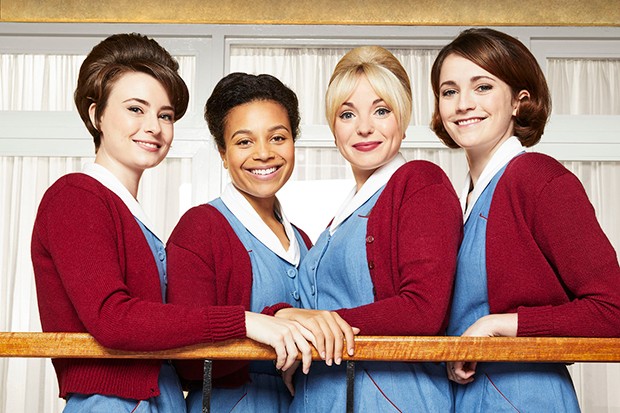
I’m watching the show Call the Midwife, which is a wonderful fantasy featuring people with modern values living in 1958-63 in a poor neighborhood in England.
In part, the show is about how awesome the national health is, as all these doctors and nurses make people’s lives better without asking for insurance cards, and that part rings true. Like Orange is the New Black, the show is based on a memoire which is only good for a season or two of episodes; once the ball is rolling, subsequent seasons are all crafted out of whole cloth and who cares? It’s wonderful.
The show illustrates how people of faith and ordinary people who aren’t as religious can work together with passion for the greater good, and come to understand, respect, and love each other. One arc shows a nurse becoming a nun; one arc features a nun leaving the order, and eventually, after a decent interval, becoming a wife and mother.
But she didn’t leave the order just for that!
Then there’s the sexism, racism, and homophobia all around them and our beloved point of view characters reactions to these things. One of the rules of the show is that it is okay for good characters to be any of these bad things for 50 minutes of airtime. By the end of every hour episode, though, they are completely turned around and think pretty much like us.
For me, this is the most powerful wish fulfillment fantasy on TV. It makes Star Trek look like a dystopia. Even TOS.
There are some longer arcs where people take time to come around. The thalidomide one. The lesbian couple struggling with their own internalized homophobia. Some family things.
Anyway, in their sexual assault program a nun is assaulted by a serial… assaulter. One suspect woman (sex worker / exploitation victim; the first term is falling out of use with some), one good housewife, (Consumed by guilt for walking away from her pram for a minute to get away from a screaming baby) and the nun, whose sin was thinking she got to ride around on her bike, that her wimple protected her magically.
Our nun wasn’t sexually assaulted; there’s only a few minutes where we suspect the inevitable has happened, after she is grabbed. But she wasn’t.
Her lack of sexual assault was a nod to the times. We work through her PTSD and loss of faith just fine without her actually being raped.
This is advice I’ve gotten from sensitivity readers on dealing with sexual violence; it is in the world, but you push it back a few notches from the characters we are compelled to viscerally empathize with. Peripheral characters and deep backstory can reveal a rape element.
This feels non-intuitive to those who remember Kurt Vonnegut’s admonition to torture our characters to see what they are made of.
But this is the new normal, and I work with this in mind.
Mostly, what I know now, is that a great deal of the art I grew up with is inaccessible to the modern generation, unless they’re odd birds interested in deep, historical study, the kind of people who watch Birth of a Nation or Triumph of the Will and of course, aren’t Nazis or KKK people, because those people have zero interest in art history and don’t bother looking at black and white movies.
Part of it is in being in the golden age of television; the modern generation isn’t compelled to experience classics with vile bits of offensive bigotry and assault embedded like shit raisins, because there is So Much Content.
The old man in me sighs. The young man in me nods. The artist in me resents the boundarys. The progressive in me thinks this is a good thing. Collectively, we get on with it and try to tell stories that matter, that are true, and that have meaning to a modern audience.
This includes of course, having a modern audience.
If that is one of your goals.
The good news? I feel permission to strip mine older stories rather than pointing young people at them. Reimagine them. Revive them. Give them new meaning and mine the gold from them. The Count of Monte Cristo and The Stars My Destination. Romeo and Juliet and West Side Story. The Tempest and Forbidden Planet. The thing is, all those leaps across the centuries are due for another leap, now. Our stupid extension of copyright to coddle Disney Corp. and other bazillionaires IP (not for content creators, but for corporations) complicates things. You have to stay on the right side of the law. But still.
The past is a different country, they do things differently there. But if what you want to get at isn’t the struggle to communicate historical differences, if what you’re doing isn’t history, or historical fiction, or even if it is, you are free to tell stories that reach out to this moment in time.
If you want to. And I do.